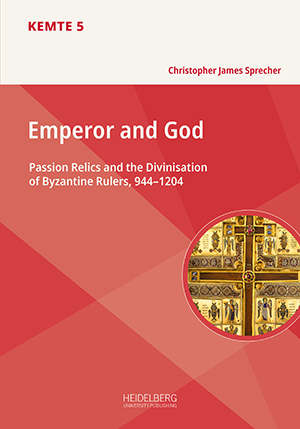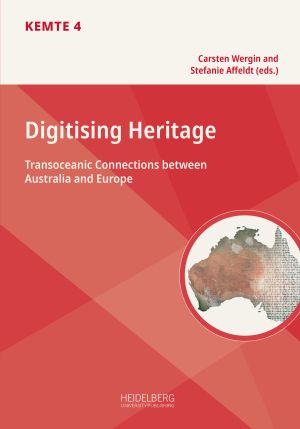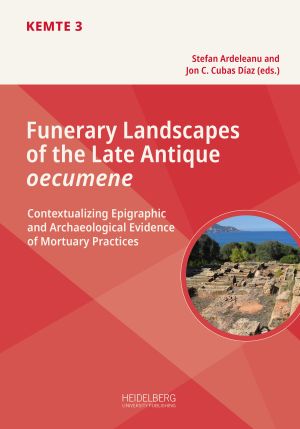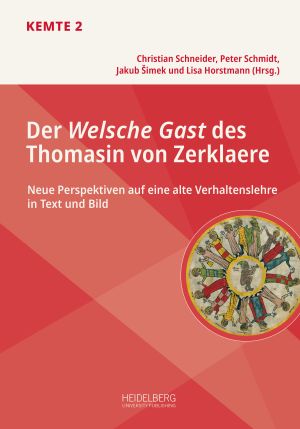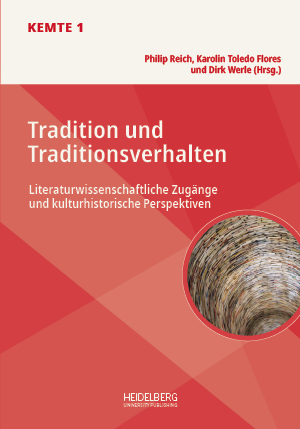Cultural Heritage: Materiality—Text—Edition (KEMTE)
The book series Cultural Heritage: Materiality—Text—Edition is based at the ‘Heidelberg Center for Cultural Heritage’ (HCCH) . It publishes volumes on cultural heritage in the broader sense, with a particular focus on reflections on the protection of cultural goods and cultural heritage. Volumes dealing with the materiality, specific presence and praxeology of cultural goods are especially encouraged. The series is also open for historical-critical editions.
The Open Access series is published in print and online. Moreover, volumes can be published as ‘enhanced eBooks’—an online reading version that can integrate text and research data. The ‘enhanced eBook’-format is a solution not only for ensuring the sustainability of research data and linking them to repositories, but also for the hitherto existing problem of combining research data and research results based on them.
All scholars of humanities and cultural sciences can publish volumes in the series; there is no epochal limit. Submissions are possible in all common scholarly languages (German, English, French, Spanish, Italian) with a focus on German and English. The book series is peer reviewed.
Cultural Heritage: Materiality —Text —Edition (KEMTE)
Editorial Board
- Prof. Dr. Christiane Brosius, Visuelle und Medienethnologie am Heidelberg Centre for Transcultural Studies (HCTS)
- Prof. Dr. Ludger Lieb, Forschungsstelle Heidelberger Editionen und Texterschließung (HEDIT)
- Prof. Dr. Christian Witschel, Heidelberg Center for Cultural Heritage (HCCH)
Scientific Advisory Board
- Prof. Dr. Cord Arendes (Public History, Univ. Heidelberg)
- JProf. Dr. Stephanie Döpper (Digital Humanities für Vorderasiatische Archäologie und Altorientalistik, Universität Würzburg)
- Prof. Dr. Stefan Esders (Alte und Mittelalterliche Geschichte, FU Berlin)
- Prof. Dr. Hanna Liss (Judaistik, HfJS Heidelberg)
- Prof. Dr. Katharina Lorenz (Klassische Archäologie, Universität Gießen)
- Prof. Dr. Ursula Kocher (Germanistik, Universität Wuppertal)
- Prof. Dr. Dr. h.c. mult. Hermann Parzinger (Ur- und Frühgeschichte, SPK Berlin)
- Prof. Dr. Anita Traninger (Romanistik, FU Berlin)
Contact
Dr. Linus Möllenbrink
Universität Heidelberg
Germanistisches Seminar
Hauptstraße 207-209
69117 Heidelberg
Telefon: 06221-54 3217
E-Mail: linus.moellenbrink@gs.uni-heidelberg.de
Published so far
Künstlersignatur und Artefakt: Schriften, Materialien, Praktiken aus transkultureller Perspektive. 6. Jh. v. Chr. bis 15. Jh. n. Chr.
In the extensive research on artists' signatures, little attention has been paid to their material, topological, and praxeological dimensions. This volume proposes a shift in focus from the texts themselves to how their effects and practices relate to the category of presence. It examines the cross-cultural relationships between text, writing, material, technique, and image, as well as the sacred and profane activities in which signed artifacts were involved. The unique potential of signatures becomes clear in the way they assert presence: they can invite contemplation and use and can combine this with self-reflection and interaction, often playing with the viewer, not least by addressing the materials and techniques that give the artefact its appearance.
Emperor and God: Passion Relics and the Divinisation of Byzantine Rulers, 944–1204
This study explores how the understanding of the Byzantine emperor as a sacred or divine figure changed in the Middle Byzantine period. It is based on close readings and studies of three medieval Passion relics held in Constantinople: the Mandylion, the relic-reliquary ensemble of the Limburg Staurotheke; and the Holy Stone. Accompanied by English-language translations of medieval Greek source texts pertaining to these relics, Sprecher demonstrates that the Passion relics in this period served to focus and narrow an understanding of the emperor not only as divinely appointed and anointed ruler, but also in surprising ways as being somehow divine himself.
Digitising Heritage: Transoceanic Connections between Australia and Europe
‘Digitising Heritage’ presents new interdisciplinary studies about the diverse manifestations of heritage in digital form, in museums, academic institutions, politics, and history. Individual contributions span across literary studies, forensics, physics, sound studies, law, postcolonial studies, archaeology, migration and museum studies. How can researchers and practitioners make effective use of digital technologies to foster a sustainable heritage engagement? To what extend can critical heritage concepts find expression in the digital age? The volume answers these questions in a multimedia format that combines audio, video, 3D graphics and technologies.
Funerary Landscapes of the Late Antique “oecumene”: Contextualizing Epigraphic and Archeological Evidence of Mortuary Practices. Proceedings of an International Conference in Heidelberg, May 30–June 1, 2019
This volume presents the first pan-Mediterranean panorama of Late Antique mortuary practices, combining and contextualizing an abundant dataset of archaeological and epigraphic evidence. In 17 contributions, a group of international specialists discusses funerary evidence from 14 Late Antique landscapes, in order to show the high diversity of microregional and local customs in funerary cultures as well as the significance of global trends. In this volume various new methodological approaches are applied: the materiality of epitaphs and tombs, their visibility, their accessibility, their perception, their setting within shifting spatial environments, as well as their crucial role within social practices. Therefore, this book fundamentally reshapes our understanding of mortuary habits and the commemoration of the dead during the transitional phase of the Long Late Antiquity.
Der „Welsche Gast“ des Thomasin von Zerklaere: Neue Perspektiven auf eine alte Verhaltenslehre in Text und Bild
In 1215/1216, Thomasin von Zerklaere composed his Welscher Gast (“The Italian Guest”), the earliest comprehensive book of court etiquette written in German. Up until the Early Modern Age, the work was frequently copied and widely disseminated. Its uniqueness lies not least in the fact that it was, from early on, transmitted together with an extensive cycle of images. This volume brings together studies from Art History, Literary Studies and Musicology into the sources, the didactic concept, the transmission of images, and the reception of Thomasin’s poem as well as into how it might be employed in present-day German language and literature classes. It proposes to replace the author-centered approach to the Welscher Gast with an approach that consistently focuses on the history of its transmission.
Tradition und Traditionsverhalten: Literaturwissenschaftliche Zugänge und kulturhistorische Perspektiven
In Western cultural history, 'tradition' is one of the central concepts to describe processes of reception and their impact. Especially in literary studies, traditions are often claimed by stating, for example, that a particular text stands 'in the tradition' of another text. Nevertheless, coherent theoretical reflection is often lacking. This volume approaches the general question "What is tradition?" and the more specific question "How can one adequately speak about literary traditions?" by theorizing the premises of the concept and by discussing its theoretical capacity on the basis of case studies from various constellations throughout literary and cultural history.



